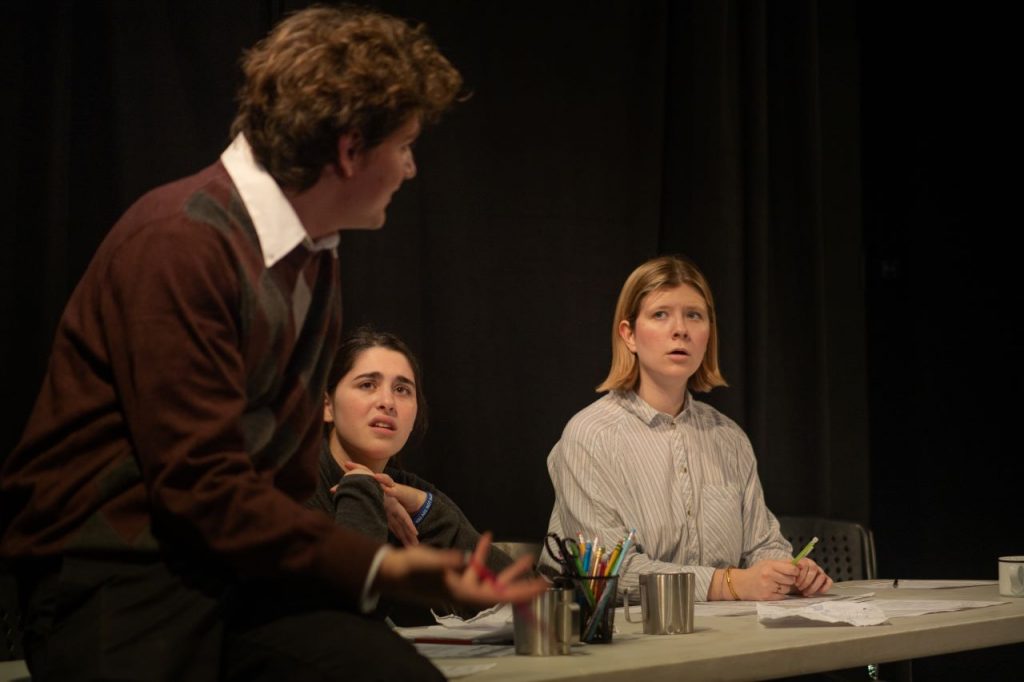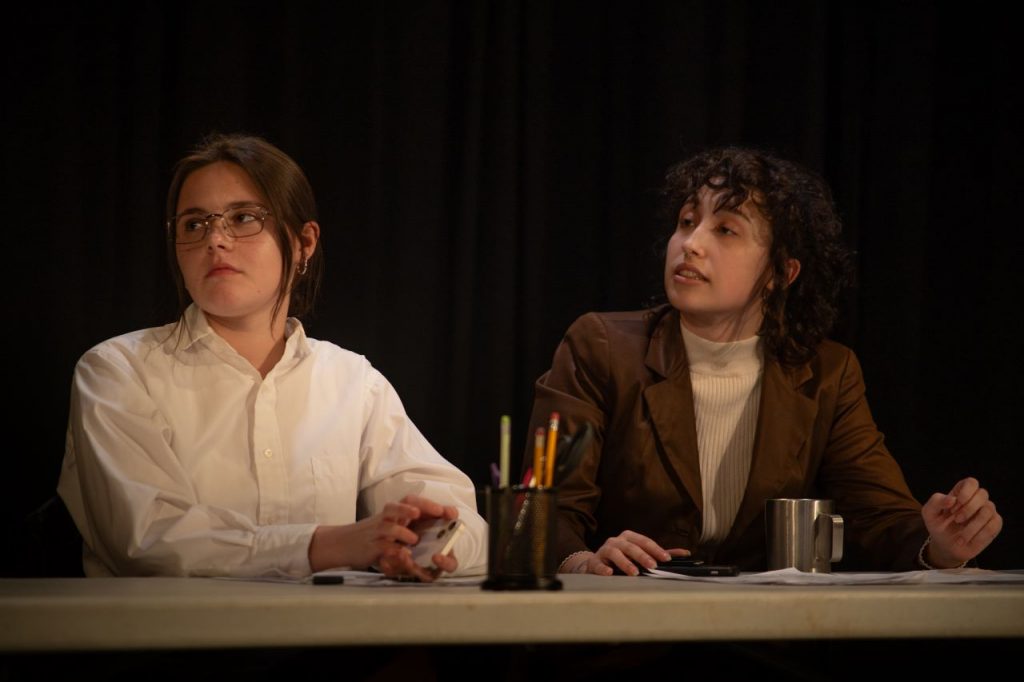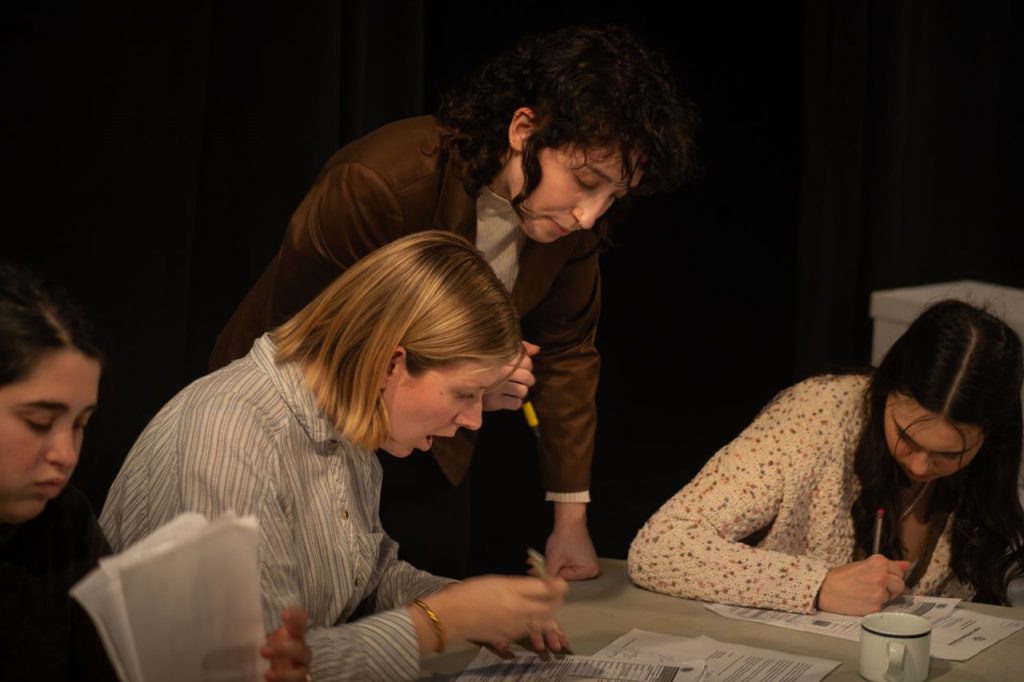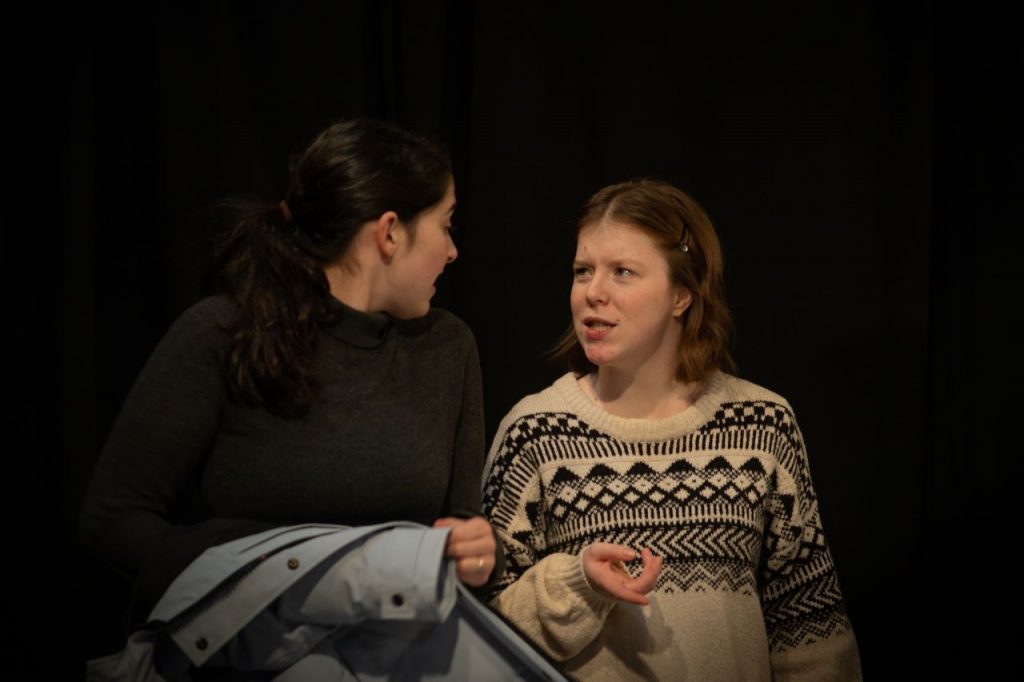BY REYN RICAFORT ’25

This article was originally submitted as an academic critique.
On November 3rd and 4th in Studio A, senior Max Weigel presented his direction of The Thugs by Adam Bock. The play is set on the 9th floor of a law firm and follows a group of lawyers on the job as rumors of a murderer in the building spread. Interspersed with moments of absurdity and comedy, The Thugs calls to attention the overwhelming indifference of workers who work in dehumanizing jobs; such is the case for being a lawyer according to the play. Rather than confronting the brutal truths of life, the lawyers distract themselves with random conversations, choosing to uplift entertaining gossip rather than trying to distinguish true from false. Weigel’s production of The Thugs successfully communicates this dilemma. Thanks to the show’s strong emphasis on lights and sound, the production establishes the eerie and almost “otherworldly” aspect of the firm, which when juxtaposed with the comedic dialogue, evokes a dissonance that brings home even further the discomfort in knowing that the characters are willfully ignoring the reality around them through seemingly innocuous conversations.

The actors of the show made the differences between their characters clear, indicating that they had done the necessary work with Weigel to make specific choices in deepening their characterizations. The actors were also evidently deft with the dialogue–or so from my perspective–and were able to keep up with one another, maintain complete lines of thought, and remain steadfast in their objectives. There were several instances when it was difficult to hear or understand what the actors were saying, so much so that they were mumbling and speaking in volumes only someone less than one foot away could hear. Whether this was intentional or not, it established the contrast between moments of distraction and moments of harsh reality when the characters’ words rang clear. The actors were also effective in communicating the characters’ inherent absurdity as individuals who had both the capacity to joke about domestic abuse and experience horror at the sight of a coworker with a broken arm. The ability to switch dispositions and states of concern was apparent and successful.

Overall, the set design suggested a world that was both familiar and distant, existing just beyond our periphery. The elevator in the middle of the stage was strategic since it became a vital aspect of the show’s forward movement. Moreover, seeing the characters inside the elevator lifting and bowing their heads together in response to an elevator ding was evocative of the play’s looming commentary on the collective dehumanization of their jobs. Despite being distinct in personalities and dispositions, the lawyers were all servants who toiled without question to a larger ethos that permeated the firm. Chantal’s departure furthers this point: by leaving the job early, Chantal escapes the indoctrination that would have relegated her to the same bond of subservience as the rest, inescapable and existing beyond one’s conscious awareness.

Lastly, lights and sound played significant roles in this production, and the results were compelling. Their effectiveness was especially prominent during the blackout scene when Elaine falls down the stairs. However, a glance at the script reveals that what Weigel did added a unique touch to what was said in the script. Other than minor details about sound and lighting, the script makes no specific mention of any other visuals during the blackout scene. Weigel’s production, on the other hand, flashed startling images on the stage, like an array of shadowy figures, veering the play further away from realism. The choice emphasized the puncturing of reality in a world distracted by its own idiosyncrasies perhaps, or maybe it was just another disturbance that the characters eventually forget about, going back to their jobs and innocuous conversations. In fact, that is how the play ends- The show blackens to the characters working away, seemingly unfettered by everything that had transpired before and was currently transpiring at the moment.
In the end, I thoroughly enjoyed Weigel’s production of The Thugs. Its ability to create a distinct and particular world allowed the audience to feel both at home and like they were intruding. The actors deftly communicated the peculiarities of their characters and moved the play along. Lastly, the use of sound and lights was evocative in establishing the conditions of the world and the greater commentary on our collective perception of normalcy. Overall, the production succeeded in telling the story on its own terms, eliciting both laughter and horror, introspection and reaction.
Photos by Coltrane Cho ‘24
***
Reyn Ricafort ’25 is the Editor-in-Chief of the Skidmore Theater Living Newsletter
